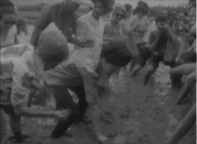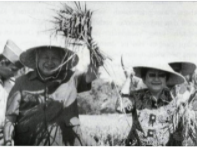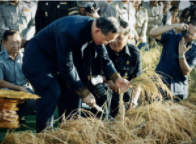Political tool
/pəˈlɪtɪk(ə)l tuːl/
noun
An entity or person being used to serve the agenda of particular political beliefs relating to the government or public affairs of a country.
From Tan Malaka’s famous quote "Padi Tumbuh Tak Berisik. (Rice Grows Quietly)", where he uses the silent growing of rice as a metaphor to reference the silent growing resistance in Indonesia against the Dutch colonials, to Sukarno’s Marhaenism, formally defined as "Marxism adapted to Indonesian conditions"1 developed from a conversation between Sukarno and a rice farmer, Marcos Ferdinand’s embracement of Miracle Rice seeds in Philippines and Thailand's Yingluck Shinawatra's rice-pledging scheme, rice has never shy away from politics in Southeast Asia. The use of rice planting or harvesting for political merits is often carefully planned, articulated and choreographed to express a down-to-earth and humble perspective of the political leaders, otherwise a POLITICAL TOOL.
1. Rocamora, J. Eliseo (October 1970). "The Partai Nasional Indonesia, 1963 - 1965" (PDF). Indonesia. Cornell Modern Indonesia Project. 10 (10): 143–181. doi:10.2307/3350638. Source
Philippines Mrs Marcos Rice - The First Lady of Philippines Planting Rice. Video credit: Associated Press
Rice fields operate under different modes in the political arena. The act of planting and harvesting always dominates the political narrative while the process of growing, often the hardest and longest part of rice farming is neglected by politicians as they are not political merit-making worthy imagery. While it appears that the rice is using the labour of these politicians for its growth, the contrary is more prevalent. These short visual abstracts projects a certain visual language of the politicians - a gesture of transforming rice into a POLITICAL TOOL.
Explore other grains




